Horizon Fuel Cell Technologies
Horizon Fuel Cell Technologies is a company founded in 2003 in Singapore, serving a diverse range of industries with various fuel cell electric energy solutions and products. Horizon Fuel Cell Technologies products and solutions are enabled by in-house manufacturing of micro-size to multi-kilowatt scale proton exchange membrane fuel cells, combined with a choice of proprietary on-demand hydrogen storage and production methods including hydrolysis, electrolysis and reformer-based solutions.
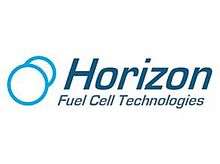 | |
| Industry | Engineering, Fuel cell, Fuel cell vehicle |
|---|---|
| Founded | Singapore (2003) |
| Founder | George Gu, Taras Wankewycz |
| Headquarters | Singapore , Singapore |
| Products | automotive, telecom, defense/aerospace, consumer products, datacenters, recreational outdoors, security |
| Website | www |
Horizon has so far focused its efforts on the commercialization of sub-kW fuel cell solutions, which consume less hydrogen and thus rely less on the existence of a hydrogen station infrastructure to succeed in the market.
By following an incremental strategy that centers around practical on-demand hydrogen fuel supply solutions with decreasing costs, Horizon Fuel Cell Technologies has grown to become the world's largest volume producer of fuel cells below 1000W,[1] serving customers in over 65 countries with what is the widest selection of commercial products in the fuel cell industry.[1]
History
In 2004, Horizon launches its first PEM fuel cell stacks with a focus on a simplified self-humidified air-breathing architecture, and begins a series of design and development iterations that reduce fuel cell costs by several orders of magnitude.[2]
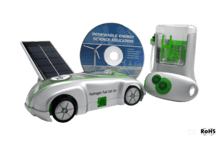
In 2005, with the completion of a first low-cost single cell, Horizon Fuel Cell Technologies creates its first commercial micro-size fuel cell product, designed as a basic science experiment kit.[2] Soon after, Horizon miniaturizes hydrogen fuel cell car together with a real-working solar hydrogen station, and launches the H-racer, which is named Transportation Best Invention of the year 2006 by Time[3] and "One of 11 Coolest New Products On the Planet" by Business 2.0.[4] This led to the progressive commercialization of over 30 energy-related science experiment products, and an alliance, in 2010, with 3D Classworks[4] to promote greater environmental awareness for sustainable energy amongst students around the world in a joint program called Destination Zero Carbon. In 2013, Horizon launches i-H2GO, its latest hydrogen car miniature merging an iOS-enabled remote control APP, Horizon's latest hybrid micro-fuel cell power systems, and a USB enabled hydrogen station.
In April 2007, Horizon's fuel cells are used to power the world's first[4] unmanned zero-emission fuel cell powered jet-wing aircraft, and set a new FAI flight distance record in a 5 kg UAV developed by Calstate-LA backed by NASA and US Air Force Research Laboratory.[2] In August, the 2007 Innovative Energy Technology Developer of the Year Award in the Asia Pacific region has been presented to Horizon Fuel Cell Technologies.[4]
2008 sees the unveiling at the Consumer Electronics Show of a first on-demand hydrogen enabled portable fuel cell named HYDROPAK[4] representing the start of Horizon's chemical hydrolysis cartridge research and development.[2] Horizon also begins works on the world's lowest cost reversible metal hydride which led to the commercialization of Hydrostik cartridges.[5]
Together with Hydrostik, and a metal hydride charging station named Hydrofill, Horizon introduces a palm-size micro portable fuel cell USB power supply named Minipak
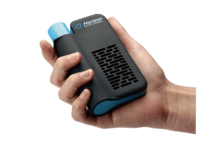
at the 2009 Consumer Electronics Show.[4] It wins 2012 Gadget of the Year status for GameKritik[6] and was acclaimed by renewable industry specialists.[7][8][9] During the same year, and following a string of small Horizon-enabled fuel cell electric aircraft flight tests in the US and Europe, Horizon launches a separate subsidiary in Singapore named Horizon Energy Systems (HES),[2] and in 2010 unveils a first 450Wh/kg battery alternative prototype named Aeropak. HES is now aiming to exceed 1000Wh/kg with its latest on-demand hydrogen technologies.
In 2010, BOC (now part of Linde Group) introduced a Horizon-made 150 W portable fuel cell power supply named Hymera which begins sales in the United Kingdom.[2] It is used in a variety of low-energy, high-efficiency applications such as construction and railway maintenance – and increasingly in off-the-grid lighting projects.[10]
In 2012, Horizon starts to work on hydrocarbon to hydrogen steam reforming, with a commercial product launch of stationary solutions planned in 2014.
2013 sees the launch of Hydromax VRLA battery charger for recreational vehicles and yachts.[2] as well as Aquigen, a scalable 200W-50 kW back-up power system for telecom, datacenters, and security solutions. In January, The Fuel cell-powered H-Rover is unveiled at the Nuremberg International Toy Fair.[11]
The Hydropak is launched.[2] representing a breakthrough 9%Wt hydrogen storage method.[2]
Products
Horizon's technology platform has three main parts: PEM fuel cells (micro-fuel cells and stacks) and their materials, hydrogen supply (electrolysis, reforming and hydrolysis) as well as hydrogen storage and pressure related devices. From this platform, stem several market-focused business units within the company, with their own lines of commercial products.
Fuel cell stacks are offered in three ranges:
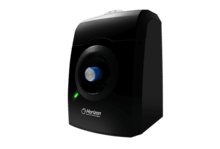
- standard off-the-shelf PEM fuel cell systems available from 10W to 5 kW, as well as customized fuel cell system configurations up to 150 kW
- premium H-1000XP 1 kW stacks which has achieved a peak efficiency of 59% during real test with one of the teams at Shell Eco-Marathon in Asia.
- Ultra-light and compact Aerostacks from 200W to 1000W.
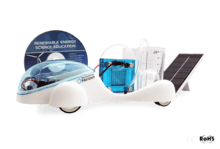
Educational products and kits. Started in 2005 with a toy car used to demonstrate a newly invented thin-film micro-fuel cell.[12] In 2010, Horizon won an international tender[12] to supply the US National Science Competition with a fast-moving fuel cell car kit used in a competitive racing format. This led to the start of Destination Zero Carbon, a global STEM education program. The South African Agency for Science and Technology and the National Research Foundation have put together a video about the importance of making Science fun to boost research.[13] Horizon's H-CELL product is featured in the video[12] In May 2013, French Minister of Industry, Frédéric Cuvillier[14] hands out the Saint Jo 24 hour race's trophy cup specially made for this challenge, which was to keep a hydrogen-powered car using rain water, with hydrolysis done by solar panels, working under competitive conditions for 24 hours non-stop. The winning car was powered by Horizon Fuel Cell.[4] It was the first time that a hydrogen powered car finished the 24 hour race,[15] a one-tenth replica of 24 Hours of Le Mans for radio-controlled car.
Portable fuel cells are designed to offer the benefit of long duration, clean electric power generation in various off-grid emergency situations. They are declined in:
- Minipak for cellphones, smartphones, GPS handhelds, Go-Pro type cameras or MP3 players
- Hydropak (50 kW - 100 kW), easy to carry anywhere, with no harmful emissions, quiet and with ready-to-use energy cartridges with unlimited storage life
- Hydromax, a deep cycle battery capacity extender for recreational use (RV, yachting)
Stationary backup power are developed internally or with integrators and partners seeking to develop cost-effective solutions.[16]
The transport division works closely with integration partners that cater both to the car industry (supplying fuel cells to the Riversimple Urban Car or Microcab[17][18]) and offers an Electric Bike Kit, a plug and play hydrogen fuel cell system designed to hybridise with existing electric bikes.
The aerospace division focuses on lightweight alternatives to batteries, where fuel cell systems combined with high performance hydrogen generators increase electric flight durations by several orders of magnitude. Early applications include wildlife poaching activity over large territories, pipeline monitoring, border patrol and geological surveys.[19] A world record was set in 2007 with Pterosoar, a 5 kW aircraft developed with Oklahoma State University and Calstate[20] - it flew 120 km (78 miles) - beating the previous record of 50 miles set in Estonia in 2006 – consuming only 16 of the 64 grams of Hydrogen stored on board in a pressurized hydrogen tank, giving the aircraft a potential flight range of 500 km (310 miles).[21]
References
- "Horizon Fuel Cell Technologies' site". Horizon Fuel Cell Technologies. Retrieved 2013-07-20.
- "About us". Horizon Fuel Cell Technologies. Retrieved 20 July 2013.
- "Best Inventions of 2006". Time magazine. 13 November 2006. Retrieved 20 July 2013.
- "Media Center". Horizon Fuel Cell Technologies. Retrieved 20 July 2013.
- "Water-Activated Generator". MIT Technology Review. February 19, 2008. Retrieved 21 July 2013.
- "Brennstoffzellen für Iphone – GameKritik Gadget of the Year 2012" (in German). GameKritik. Retrieved 20 July 2013.
- Dehamna, Anissa (February 28, 2011). "Fuel Cell Envy". matternetwork.com. Archived from the original on 5 March 2013. Retrieved 21 July 2013.
- Parsons, Sarah (May 20, 2011). "Testing the Goods: Horizon MiniPak Portable Fuel Cell Charger". popsci.com. Retrieved 21 July 2013.
- Evans, Robert (January 10, 2011). "The Most Exciting Product of CES 2011: Horizon's Hydrogen Fuel Cell Power Packs". i4u.com. Retrieved 21 July 2013.
- "BOC launches hydrogen cylinder to power Hymera fuel cell portable generator". renewableenergyfocus.com. 14 July 2011. Retrieved 21 July 2013.
- Coxworth, Ben (January 30, 2013). "Fuel cell-powered H-ROVER puts you in the NASA tech's seat". gizmag.com. Retrieved 20 July 2013.
- "Educational kits". Horizon Fuel Cell Technologies. Retrieved 21 July 2013.
- "Science can be fun". Youtube. NRF SAASTA. February 2013. Retrieved 21 July 2013.
- "Saint JO 24-hour race – the hydrogen-powered electric car finishes 7th overall". Fuel Cell Works. Archived from the original on 14 July 2013. Retrieved 20 July 2013.
- Dupeux, Émmanuelle (May 4, 2013). "Saint-Martin-Boulogne: cette année, un défi épice les 24 heures de Saint-Jo" (in French). La Voix du Nord. Retrieved 20 July 2013.
- "Stationary Back-up Power". Horizon Fuel Cell Technologies. February 2013. Retrieved 21 July 2013.
- "AUTOPAK Automotive fuel cell System". Horizon Fuel Cell Technologies. Retrieved 21 July 2013.
- Davis, Brett (September 27, 2011). "Microcab H2EV hydrogen fuel cell car to debut in UK this week". Car Advice. Retrieved 21 July 2013.
- "Aerospace". Horizon Fuel Cell Technologies. Retrieved 21 July 2013.
- ""Pterosoar" PEM Hydrogen Fuel Cell Plane". Oklahoma State University. Archived from the original on 19 June 2010. Retrieved 21 July 2013.
- McKeegan, Noel (November 3, 2007). "Micro-UAV distance record smashed". Gizmag. Retrieved 21 July 2013.